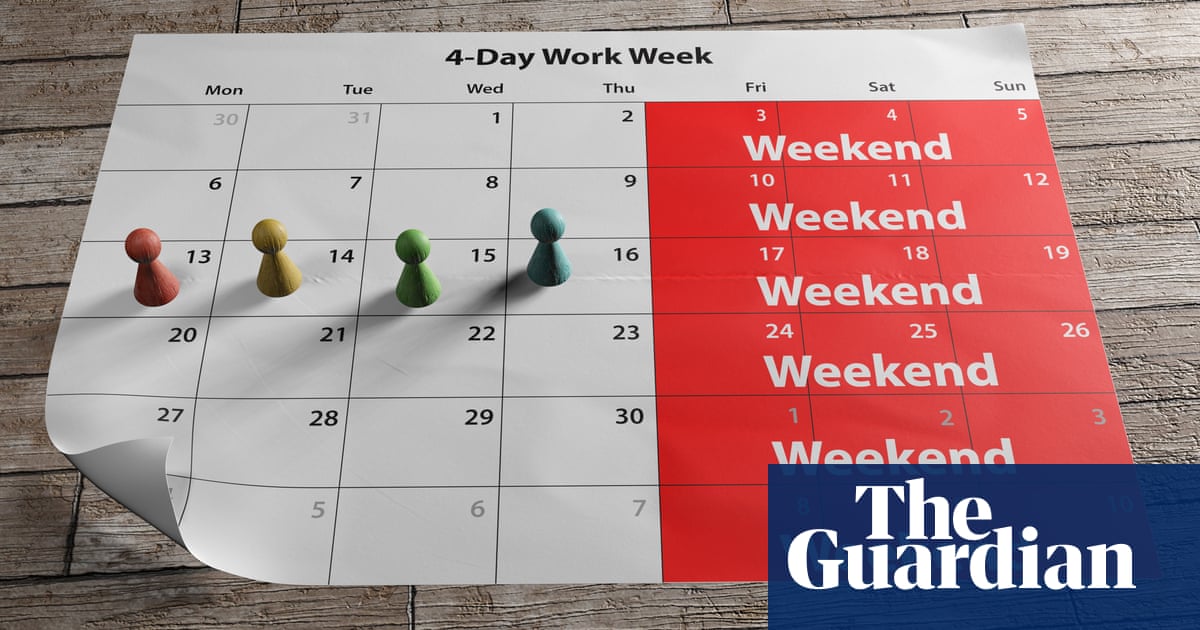
Hair stylist Joel McCauley had seen too many colleagues burn out after a perpetual cycle of work, eat and sleep, so when he opened his own salon in Cardiff he was determined to do things differently.
Staff at Slunks in Morgan Arcade now work a four-day week for no less pay than for working five days. They are happier, more productive and provide a better service, said McCauley.
“When you have more time, you can think about life in a different way,” he said. “At work, you’re likely to have more energy and fewer non-productive days. Outside work, you can be a better person, a better parent, a better member of the community. I feel better, staff feel better – we’re all working better.”
More people could be working a four-day week across Wales after the country’s future generations commissioner, Sophie Howe, called on Monday for the Welsh government to launch a shorter working week trial.
Howe, whose role – enshrined in law – is to protect the interests of future generations, said the public sector should lead the way and inspire other businesses to follow suit. She acknowledged there would be a heavy cost to the public sector in the short term, but argued that it could eventually mean increased productivity and savings for society if it led to a healthier workforce and more cohesive population.
Howe said: “It’s clear that following the pandemic, people across Wales are re-evaluating their priorities in life and looking for a healthier work-life balance.
“The escalating demands of caring for loved ones due to an ageing population and an increase in mental health issues, exacerbated by working long hours, are just some of the factors that make a shorter working week more appealing.
“The working week has not changed for more than 100 years and now seems the perfect opportunity for the Welsh government to commit to a pioneering trial and build evidence for greater change across Wales.”
A report by the commissioner and thinktank Autonomy found that about two-thirds of Welsh people would ideally work a four-day week and almost 60% said they would support the Welsh government piloting a scheme to move towards it.
The report says moving to a four-day week in the Welsh public sector could be particularly effective as sickness rates are high and giving staff an extra day off could help to tackle this.
It says it would foster better cohesion by giving people more time to take part in community groups and projects, and could cut carbon emissions by reducing commuting. It also argues that a shorter working week would especially help women, who have less free time on average than men.
The report calculates that if the public sector in Wales moved to a four-day week for full-time workers, an extra 27,000 employees would be needed, which would cost £1bn. If productivity gains were to increase above 10%, the cost of the policy “would quickly become negligible”.
Jack Sargeant, the chair of the Welsh parliament’s petitions committee and a supporter of a shorter working week, said: “We work some of the longest hours in Europe and this is clearly detrimental to workers’ lives and, the evidence suggests, to productivity as well.
“Those that oppose it make the same tired arguments that opponents of progress have always made. The workplace and our lives are changing. Automation and AI will change it even more. A shorter week would be a great way of giving working people some of the fruits of these changes.”
Shavanah Taj, the general secretary of Wales TUC, said: “The fight for decent working hours has always been at the heart of union campaigning. We welcome this call for a shorter working-week trial.”
A Welsh government spokesperson said: “We recognise potential benefits in a shorter working week and some businesses in Wales are already expressing an interest in moving in that direction. We are considering the progress of pilots in other countries and examining the lessons Wales can learn.”
Chelsea Thompson, 28, a salon manager at Slunks, said she was more focused and content. “I’m commuting less and when I’m in, I’m definitely more focused. Since we started the four-day week, everyone says they’re happier. People feel well-rested, mentally prepared. That extra day is for me. I go for long walks, listen to a podcast, see friends who don’t have weekends off. Time is precious.”












